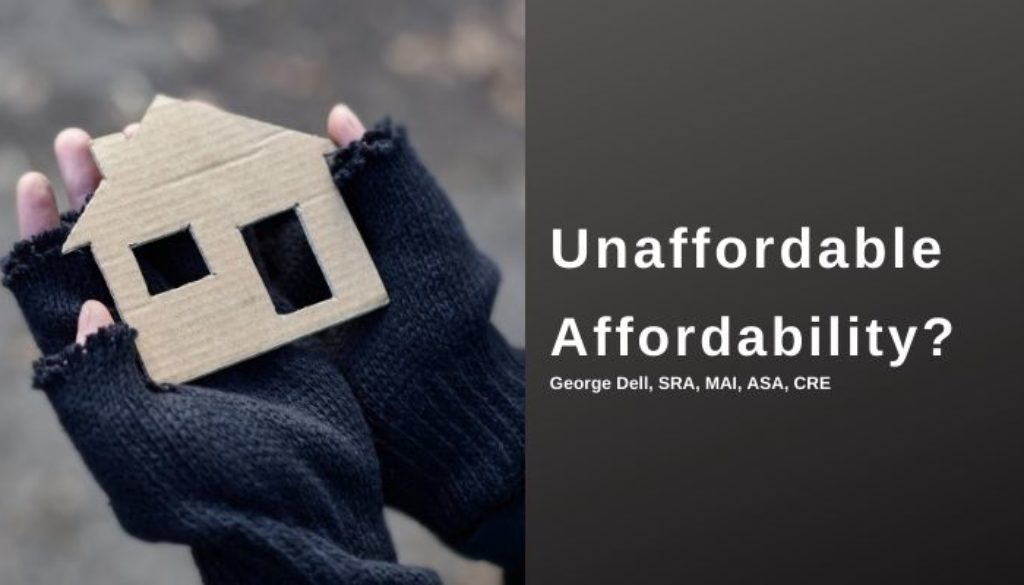A great deal of economic, social, and political talk has been around affordability of housing. To explore this topic, it may be helpful to ask some questions. Good policy starts with the right questions.
In simplest terms, some people have the resources to have nice homes in nice neighborhoods, others have just tolerable homes for shelter. And others have no homes at all. We call them “home-less.”
More recently, we have become aware of the connection of poor housing and groups of certain ethnic categories. Discovery. There is association between housing status and ethnicity. Now what?
I have no desire to take sides, yet find due to our cultural “polarization” any discussion or opinion not to the liking of one extreme or the other – attracts angry attack. In the absence of total agreement, any input, question, or observation is vilified. Mere mention of opposing fact is seen as opposing position bias. The active search for an informed middle ground seems to irritate everyone.
Back to housing prices, ethnicities, and affordability. Yes, it appears that correlation (mathematical association) has been found between low home valuations and certain ethnic groups. So here it comes: not political, not spiritual, not social. Just a statement of facts:
- Low valuations are correlated with some ethnic groups.
- But correlation does not prove causation.
Correlation simply means two things are related. Cause must be supported by economic, social, or psychological theory, or simply the action of law. The data alone will not do it.
For example, it has been found that drownings correlate with sale revenue of ice cream! Ice cream kills people! It must be stopped!
Oh wait. This can’t be. It must be the opposite. Drownings must bring on more ice cream licking! Oh wait. None of this makes sense. Yet. Yet, there is a correlation. These two variables do move together. Yet there must be a cause. What could it be?
Could it be summer?
And yet. And yet. Could it be possible that people eating too much ice cream, then go into the water, then get cramps, and drown! Possible?
Yes, it is possible. That is why we do science: “Systematic study by observation or experiment – by an expert in systematic study in that field of study.” It is not magic. It is simply the willingness, and desire — to question one’s own beliefs.
AND. There is another issue. I am pleased that the current FHFA (Federal Housing Finance Agency) request for information specifically asks for thoughts on potential unintended consequences. If you have read Jeremy Bagott’s book, entitled Dispatches from the Cosmic Cobra Breeding Farm, you know the story, as it applies to real estate appraisal. The story goes to the British occupation of India. Killer cobras were rampant. This had to stop.
The regulators decided to put a bounty on cobras, dead or alive! It worked. For a few weeks. And only until cobra breeders started to breed cobras for the bounty. (Unintended consequence #1). The regulators had to stop this abuse! The policy was cancelled. And what did the cobra farmers do? Turn loose the cobras. (Unintended consequence #2).
To resolve the housing issue, we must look elsewhere for why identical houses are being valued differently in different neighborhoods, populated by different ethnic groups. We must look elsewhere – at the same time knowing that it is possible — that some form of discrimination or history causes different prices.
We must look for unintended consequences and related issues. If we value higher, what about affordability? What is the cause? What is the effect? What is the unintended, unexpected result? Like the loose cobras, well-intentioned housing policy must seek possible unintended consequences.
Editor’s Note: We are not an Amazon Affiliate. We do not make any money from the purchase of Jeremy’s book, but we hope you’ll read it anyway.

February 3, 2021 @ 9:00 am
thank you so much for this sensible explanation of correlation – refreshing to read something that makes sense.